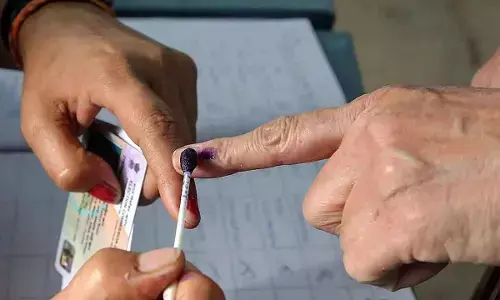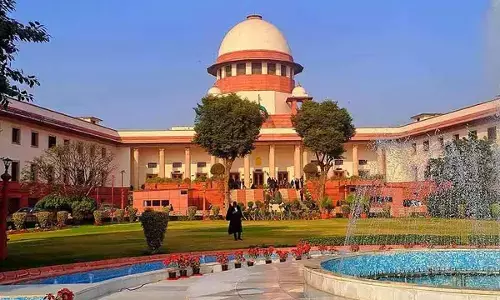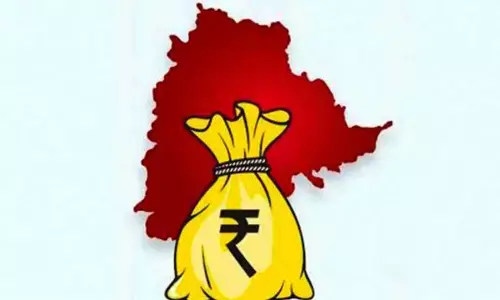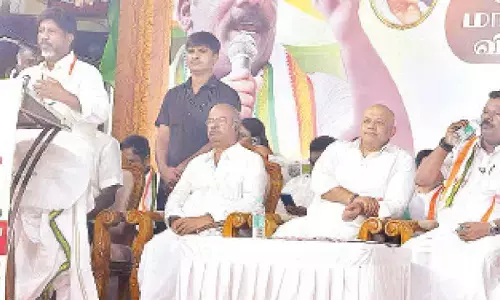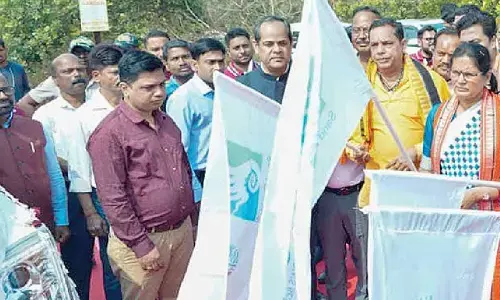MyVoice: Views of our readers 11th June 2023

MyVoice: Views of our readers 2nd February 2026
The Japanese haiku has made a profound impact on the modern Telugu poets.As early as 1991,Ismail brought out his haiku in a book form titled ‘Vaanakaalam haiku’. (The haiku of the rainy season).
Haiku spells its cast onTelugu literary world
The Japanese haiku has made a profound impact on the modern Telugu poets.As early as 1991,Ismail brought out his haiku in a book form titled ‘Vaanakaalam haiku’. (The haiku of the rainy season). Penna Siva Rama Krishna brought out the first anthology of haiku under the title ‘Rahasya Dwaram‘in 1991.He also translated a number of haiku into Telugu and contributed richly to the popularity and progress of Telugu haiku.
In 1994, Gaali Narasa Reddy translated Japanese haiku and familiarised them to the Telugu poets and readers. Talathoti Pridhvi Raju founded ‘Indian Haiku Club’in 2002.
He published a collage of articles titled ‘Akshra Kuteeram‘and even started a monthly in 2004.The articles of Sikhamani in Vividha and Rentala Sri Venkateswara Rao further gave a fillip to the novel field of Telugu Haiku.
BVV Prasad’s ‘Drisya Drisyam‘ (1995),Lalitanand’s ‘Akasa Deepalu’ etc significantly popularised the new trend of writing haiku. A new age in modern Telugu literature, thus,started making room for the haiku.
A host of highly talented and creative poets such as Lalitanand,Gaali Narasimha Reddi,Nalla Narasimha Murty,Ravi Ranga Rao,PLakshmana Rao,RVS Bharadwaja,Bhagwan, Addepalli Jyothi, Ratnamala, Srinivasa Goud,,Joseph,et al further enriched the spread of haiku in the literary journals.
What is so unique about the haiku? To put it in brief,it is a Japanese verse form of three lines,the first and the last of which have five syllables and the intermediate seven.The Japanese have formalized many ordinary objects of life into poetic symbols. Trees,rivers,flowers and even historical personages have been mentioned over lines rather than personal ones in poetry. This provides an economical,metamorphical structure that connotes much’.
“From the inert world of objects, the haiku poet draws out a pulsation and hues it with the throb of life,” says Avantsa Somasunar,an eminent poet. ‘’Like the ripples that still last even after the stone was flung into the pond and later found no clue, the haiku leave lasting impressions’’ opines Ismail a renowned modern poet and critic who specialised in Telugu haiku. According to Addepalli Rama Mohana Rao, “To hold infinity in a meditative mood and embrace its totality of effectand experience and enable the reader to empathise with it is the purport of a haiku.’’ A mini poem establishes an instantaneous relevance to the societal/ social context, while the haiku delves deep into the subconscious layers and implants an indelible image. A haiku is born of a flash of a meditative mood. ’’An abstract image assumes a concrete shape and feel and leaves a lasting image on the mind of the reader.
Ismail blazed a trail in the realm of haiku. His haiku are experiential in every aspect, display a rare empathy with nature,throw light on the inner life of things and project images of enduring appeal. His ‘’Kappala Nissabdam’ (Silence of the frogs)amply testifies to his insight into the life of things.
“Since the lights are off
She lit the candle
Lo! In the glow lovelier lights”
Ismail rouses us into an alert awareness of seeing into the life of things beyond their normal shape and colour in the context of a new light casting its own glow on the objects and presenting them as objects anew and afresh.
In another haiku, he describes the after effects of an action which haunt even when the doer /agent is forgotten.
“Somebody flung a pebble
Into the pond
The ripples still astir
Where is the pebble?”
In the haiku of B V V Prasad, the inhumanity of humanity is condensed in a single ‘dense’ image.
“The tree crashed
Even the shadow
They carried away”
In his haiku, the wind does not simply carry the chirp of many-hued birds but even acquires their hue:
“The birds are chirping
The wind abounds in
Sounds of all hues”
In another haiku, he says
“The distant light
Protecting it
Pervades the boundless dark”
The paradoxical situation points to the profound truth of the inseparableness of light and dark.
Profundity,rather than obscurity, of thought and feeling and clarity of a mental picture rather than blurred vision of concrete objects characterise Maakineedi Surya Bhaskar:
“The bird alighting on the mirror
Was pecking at its image-
Memory of the beloved far away”
Here is a hint at the sweet incisions of a sad memory.
N.Narasimha Murty explores the eternal unrest that haunts man even in his sub-conscious state.
‘Man is asleep
But then
Hunger is still awake.’
A SRaja Rao uncoversthe ignorance of such values as individual freedom and liberty in an exploitative set-up:
‘’Around
The black veiled woman
The dense dark”
PRL Swamy‘s description of the impracticalityof restoration of a past goneby is here.
“Chewing the cud
Of memories
The hollow mouth.”
Unlike the minipoems which deal with the multi dimensional aspects of society,the haiku penetrate the subconscious layers and create a meditative mood where in the mind establishes an empathy with the object contemplated.Sirisha’s haiku summons forth the image of a revolutionary soaked in blood.
‘Sign posts are they
Crimson eyed all over
-A coral tree’
Such haiku as
‘The closed eye
A secret passage
To the sky with in me’
by Penna Sivaramakrishna
‘Returned with dust
Leaving behind the moon light’ by PLakshman Rao, and
‘Joined hands
To make the wick
Lo ! myself turned lamp’
by Dr Ravi Ranga Rao are worthy and proud contributions to the spread and prominence of Telugu haiku in the world of literature.
– SMKompella, Kakinada
The unending honeymoon by Canada’s Prime Minister Justin Trudeau seems to continue with pro-Khalistan elements despite serious and severe objections by India. India has been making it clear that Canada’s ties with India cannot be on an even keel as a result. But, Canada’s affinity with Khalistan is all about Trudeau’s political survival, which the anti-Indian Sikh community in Canada is capitalising.
Canadian MP Chandra Arya gave his mind about the dangerous deviation trend and style of present dispensation under PM Trudeau that was at its best as a true Indian could have done who settled in a foreign country. Minister for External Affairs Jai Shankar, too, left no stone unturned to be being critical of the Canadian government in allowing the radical and anti-Indian Khalistan elements to flourish in the country, while Canada takes a high moral ground when it comes to democratic values getting eroded in India for no valid reason, instead of looking at its own ground reality prevailing there.
It is seen that Canada and Australia have become breeding grounds for Khalistan elements. It is good to see that Australia understood the stern language of India’s disagreement with recent attacks on Hindu places of worship in the country by Khalistan elements as stringent action is in place to avert and discourage such incidents by the government in Australia, in the wake of PM Narendra Modi’s visit to that country, who succeeded in putting some sanity in the mind of the present dispensation there posing a serious stumbling block in the growing ties between the two countries.
The Brampton parade was the last straw in Canada’s growing helpless and increasing clout of the pro - Khalistan elements when the float of India’s late Prime Minister Indira Gandhi was depicted in a blood-soaked white sari as her Sikh bodyguards brandishing guns, to coincide with the 39th anniversary of Operation Blue Star, observed on June 6. It is apparent that as long as India is not assertive and tough on the misconduct of other countries in terms of allowing radical and fringe elements to flourish in the countries, there cannot be any behavioural change on their part to view India's concerns.
– S Lakshmi, Hyderabad
Mere condemnation will not be enough. The Canadian government must take strong action against these Khalistan supporters who celebrated the assasination of former Prime Minister Late Indira Gandhi at Brampton on the anniversary of Operation Blue Star. Such events do not augur well for the bilateral ties of the two countries. By no means can the Canadian government provide so much space for these extremists people who advocate violence. By glorifying the violence Khalistan supporters have crossed the line. There have been attacks on Hindu temples in the country too in the recent past, so Khalistan supporters' influence is growing in Canada and it is high time that the government there nip the bud before it's too late and it turns into physical violence too.
– Bal Govind, Noida
Apropos editorial "Trudeau's filtration with Kalisthanis continues," (THI, June 10). Events organised by Sikhs across the globe to mark the anniversary of Operation Blue Star often stir polarising sentiments. But this year’s parade at Brampton in Canada’s Ontario province has overstepped the bounds of decorum with its float depicting Indira Gandhi’s assassination, triggering sharp reactions. Separatist elements settled abroad have kept the Khalistan pot boiling, issuing inflammatory statements and funding the ‘cause’. Countries such as Canada and the US became safe havens for separatists after they were granted asylum there during the dark days of terrorism in Punjab.
Interestingly, the Blue Star remembrance event in India, mainly in Amritsar, has progressively become rational over the years. This year, the Akal Takht appealed for a reform movement in villages plagued by drug abuse and other social evils. Many Punjabis seem to have moved on and are in favour of peace. The ground situation is not in sync with the Sikh diaspora’s efforts to keep secessionist extremism alive. Canada’s political leaders cannot escape culpability for encouraging extremism in a bid to consolidate their vote banks. MEA S Jaishankar has rightly hit out at Canada, saying that the event entailed “a larger underlying issue about the space which is given to separatists, extremists and people who advocate violence.” Earlier this year, concerned over the breach of security in the Indian High Commission in the UK, India had pointed out that Khalistan radicals were misusing their asylum status to aid and abet terror activities in India. Such disturbances are also not congruent with the efforts being made by the governments of Canada and the UK to boost bilateral ties with India.
– N Sadhasiva Reddy, Washington
Collective action must for a healthier future
In recent years, food safety has emerged as a pressing global issue, presenting increasingly complex challenges. The advent of globalisation has brought forth a multitude of obstacles, as food from various corners of the world is now intricately interconnected and processed in unprecedented ways. This interconnectedness often leads to heightened risks of foodborne illnesses, exemplified by outbreaks of bacteria such as E. coli. Furthermore, the rise of antibiotic-resistant bacteria poses a significant threat to food safety. The widespread use of antibiotics in agriculture has contributed to the development of these resistant strains, which can have severe consequences for human and animal health when consumed.
These challenges emphasize the importance of working together globally to ensure food safety. Food safety is crucial for achieving food security as it directly affects our ability to meet nutritional needs, stay healthy, and support strong agricultural sectors. Ensuring the safety of our food is essential, as it has a significant impact on both our health and the sustainability of agriculture. By prioritizing food safety, we not only protect human well-being but also contribute to the development of sustainable food systems and promote fair market access. As we commemorated the fifth edition of World Food Safety Day (WFSD) on June 7, 2023, the slogan "Food safety is everyone's business" underscores the shared responsibility of individuals throughout the supply chain in preserving the safety of our food. Alarmingly, foodborne illnesses affect 600 million people annually, leading to a wide range of diseases and causing 420,000 preventable deaths each year, with particular vulnerability among young individuals and those with limited resources.
The safety of the food we consume relies on the implementation of food standards. This year's theme, "Food Standards Save Lives," emphasizes their critical role. However, it is not enough to have these standards in place as mere words on a page. It is essential for countries, food businesses, and consumers to actively embrace and enforce these standards through dedicated commitment and action. Celebrating its 60th anniversary, the Codex Alimentarius Commission brings together 188 member countries to develop and prioritize relevant and effective food standards. Food standards alone do not save lives, but it is our collective action in implementing science-based standards that truly makes a difference. Food safety is crucial throughout the entire production process, from harvest to consumption. Together, we can reduce preventable foodborne illnesses.
– DrKrishna Kumar Vepakomma, Hyderabad
AP govt gives shock to middle classes
The middle class sections in Andhra Pradesh are cursing the Jagan government for the inflated electricity bills served to them.To the actual consumed energy charges, so many charges are added under the heads viz., demand charges,cust.charges,Ed charges,true up charges,FPPCA charges which bulged the bill amount and the middle classsectionsare unable to bear the extra burden apart fromthe increase in the tariffs of power units.
My own experience is for the first time I got a huge bill of Rs4,763, despite not adding any new electrical gadget in the house,even if the power is used more during summer for operating air conditioners,the jump of 70% in bill amount is painful. The middle class who form a majority pay sincerely income tax apart from paying regular taxes imposed by the state government under peculiar names. We have no reliefunder the present government.The governmentlike a charitable trust freely distributing money to the deserving and undeserving in the name of welfare incentives,keeping the state progress and development on the back burner.
Thestate long back forgot investingin infrastructure and development of industries andlaying of roads. Whom can we approach for the genuine grievances redressal? We are alreadygroaning under the weight heavyprices of provisions, edible oils and fuels,the inflated power bills added up to our agony, if the same tempo of penalisingmiddleclasssections for meeting the unproductive freebies of state,we may get sandwichedbetweenthe thankless government andthe unbearable burden of running family with meager incomes. Will the government hear our wailing? Maybe the present government’s single focus is how to come back to power at the cost of state’s progress using rotten freebies formula.
– Rama KrishnaM, Kakinada
WHO IS FAIR, AND WHO IS FOUL?
"Fair is Foul, Foul is Fair," says William Shakespeare. The protest of the Indian wrestlers for action against the chief of their federation (WFI) for his alleged acts of sexual harassment has been, alas, going on for six long months. One reason for this protracted protest is that the Central government has erroneously taken the issue 'lightly.' Another reason is that even police and some sections of the Media too have not played their roles the way they are expected to play.
Why did police refuse to register an FIR in the first instant? The gifted sportspersons scored a point when the Supreme Court directed police to register a case.Why then no action has been taken against the erring police? The protesting wrestlers are right in asking the government to make the report of the SIT public because they are a party to the case.Now can it be deduced that the SIT has not given a clean chit to BrijBhushan?
In all fairness, the government was expected to have taken aggrieved women into confidence because they are the victims and have no parochial and political motivations what soever.The protest would have ended if the Government asked BrijBhushan to go on leave at least after receiving the report.
The silence and inaction of the Government do send wrong signals to our young and promising sportspersons who dream of a career in sports.So much for some sections of the media who, instead of backing women victims, have taken a stand against them and written and reported about only one side of the issue.These media houses have tried to say that "Fair (wrestlers) is foul, and Foul (BrijBhushan) is fair.' The true media is one that always works and stands for Truth and Justice.
It is only natural for political parties trying to gain some mileage and advantage out of every issue faced or neglected by the Government. So, their support to the protesters shouldn't make the Government Indifferent and blind to the raging issue.
Modi knows that BrijBhushan has been at the centre of such allegations since 2012.He also knows that sexual harassment is rampant in our sports and Mary Kom,the Head of the Oversight Committee also faced such harassment.And he knows that many sports administrators in the past also indulged in such'unsportingsport'.Modi is game to do something to protect our sports profile.It is time,the wrestling match between the Government and the hurt wrestlers ended on a true sporting note.
– M Somasekhar Prasad, Hyderabad
Your editorial "PM seems blind to pathos of Haryana betis" was an apt editorial. You rightly said that the ill treatment of the women wrestlers by the Police has done irrevocable damage to the future of the sports of the country. It is very sad to note that parents are now asking girls to leave sports and get married.
Because of the government inaction and delay in the arrest of BrijBhushan, the wrestlers have suffered immensely – even the police brutality. Coming to the support for wrestlers, the Indian Olympic Association’s silence,the PM’s silence,the police brutality, the system supporting the oppressors – all have led to new grapplers losing interest in sports.
Now the budding grapplers are fearing their safety following the sexual harassment of BrijBhushan, the parents are trying to stop their daughters from entering the sports fraternity.
The ongoing incidents has affected parents and girls a lot. Many parents are telling that the PM could have listened to the wrestlers and address their issues. The government inaction in arresting BrijBhushan proves that it is definitely not with ‘BetiBachao, BetiPadhavo.’It should remember that not only in Haryana,the entire country is keenly watching and now they are hesitating in sending their girls in any sports field. It should introspect and do something to the betis of this country for joining in the sports field.
– Zeeshaan,Kazipet








